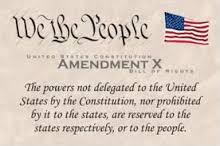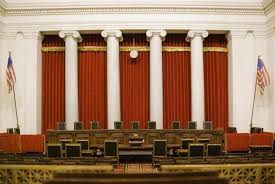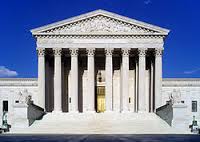The powers not delegated to the United States by the Constitution, nor prohibited by it to the States, are reserved to the States respectively, or to the people.
The Tenth Amendment was created to round out the Bill of Rights and make sure that all natural and unalienable rights that are promised to the citizens are protected. Originally, some states had voted against a Bill of Rights, for they believed that the Constitution they had constructed limited the government enough and would allow state constitutions to delegate and outline those rights not specifically listed by the federal government. However, not all states were in agreement about not creating a Bill of Rights and many had only agreed to ratify The Constitution on the belief that a Bill of Rights be formed later on. The Tenth Amendment speaks most simply and poignantly about the core beliefs of those citizens wanting a Bill of Rights; these citizens wanted all powers not given to the government to belong to the people, so that a true government by and for the people could be established.
A landmark Supreme Court case that debated some of the topics brought up in the Tenth Amendment was Bond v. United States in 2011, which is relatively recent. Carol Bond had been tried and found guilty on attempting to poison her husband’s mistress twenty-four times and mail theft twice. Bond had been charged in Pennsylvania on two counts of possession of a chemical weapon, which violates a criminal, federal statute under the 1993 Chemical Weapons Convention. Bond’s attorney’s defended her by stating that the statue was only applicable to “rogue states” and terrorists and that Bond should have been charged and prosecuted under state law, not federal. Having been found guilty, Bond lost on appeal based on the fact that the court believed she “lacked standing to challenge the constitutionality of the statute on the basis of the Tenth Amendment.” The constitutional question posed here was whether or not Bond, a convicted criminal, had the grounds to challenge the stance that the federal government was acting beyond their delegated powers, which would be in violation of the Tenth Amendment.
The Supreme Court unanimously decided in favor of Carol Bond and stated that yes, Bond does have grounds to challenge this federal statute based on the fact that it violates the Tenth Amendments clause that gives all powers not deemed to the federal government to the state governments and their people. They also stated that no citizens may be prosecuted under a constitutionally invalid law.
In the end, it appears to be that the Tenth Amendment was created to act almost as a grey area when it comes to constitutional law, for it allows the court to make decisions that are pertinent to the time period or based on special circumstance. It almost provides them an escape if they are ever in a “jam” when it comes to constitutional law. This, I believe, is a good thing because as we have seen so many times the law can become outdated, and the Tenth Amendment allows for its modification. Although, one place where the Tenth Amendment may cause some controversy is in its ability to mold to different situations, for then the law may become too fluid and lack regulation.
Websites:
https://www.oyez.org/cases/2013/12-158
https://constitutioncenter.org/interactive-constitution/amendments/amendment-x




